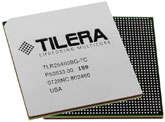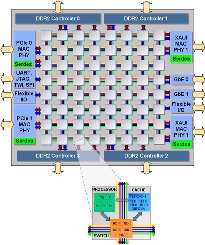
Tilera, società statunitense operante nel settore della produzione di componenti
microelettronici, specializzata nel design e nella realizzazione di microprocessori in
architettura a multi-core, ha lanciato - mediante il comunicato allegato di seguito - il
processore TILE64.
Il chip rappresenta ad oggi il primo esempio di unità di calcolo appartenente alla linea
Tile implementata mediante l'innovativa architettura Mesh, che è in grado di scalare in maniera eccezionale, arrivando a supportare l'integrazione di "centinaia ed anche migliaia di core".
Nello specifico, il TILE64 (cfr. foto seguente) include 64 core, ciascuno dei quali è dotato di tutte le funzionalità necessarie alla esecuzione di un Sistema Operativo complesso come una distribuzione Linux. In accordo al produttore, il TITLE64 può offrire prestazioni dieci volte superiori a quelle di uno Xeon dual-core di Intel.

Un simile risultato è stato ottenuto abbinando all'architettura altamente scalabile Mesh un nuovo modello di programmazione per cpu multi-core in grado di superare i modelli attuali "troppo legati alla concezione del processore a single-core".
I mercati interessati dall'arrivo del TILE64 sono quelli dell'embedded networking e del multimedia. Il prezzo per blocchi da 10.000 unità è pari a $435; sono inoltre in arrivo varianti con 36 e 120 core.
Segue lo schema a blocchi del TILE64.

[Immagine ad alta risoluzione]

HOT CHIPS 19, STANFORD UNIVERSITY - Aug. 20, 2007 - Tilera Corporation today launched the TILE64 processor, the first in a family of Tile Processor chips based on a revolutionary architecture that can scale to hundreds and even thousands of cores. The TILE64 processor contains 64 full-featured, programmable cores - each capable of running Linux - and delivers 10X the performance and 30X the performance-per-watt of the Intel dual-core Xeon, and 40X the performance of the leading Texas Instruments DSP*. Initial target markets for the TILE64 processor include the embedded networking and digital multimedia markets.
Tilera was founded in 2004 to bring to market the MIT research of Dr. Anant Agarwal who first created the mesh-based multicore architecture in 1996. The "Raw" project received multi-million dollar DARPA and National Science Foundation grants and spawned the development of the first tiled multicore processor prototype and associated multicore software in 2002. Backed by this immense body of work, Tilera holds 40-plus patents pending and a significant lead over other processor and DSP companies who are only now recognizing a need to adopt a similar multicore approach. Tilera has a dozen customers who are currently integrating the TILE64 processor into products in the advanced networking and digital multimedia space.
"This is the first significant new chip architectural development in a decade," said Tilera President and C.E.O., Devesh Garg. "We developed this new architecture because existing multicore technologies simply cannot scale beyond a handful of cores. Moreover, customers have repeatedly indicated that the current multicore software tools are very primitive because they are based on single-processor-core models. We're introducing a revolutionary hardware and software platform that has solved the fundamental challenges associated with multicore scalability."
Tilera's iMesh Interconnect
Tilera's new architecture provides superior performance because it eliminates the on-chip bus interconnect, a kind of centralized intersection that information must flow through between cores within the chip, or before it leaves the chip. As engineers have added more cores to chips, the bus has created an information traffic jam because packets from these cores all must travel to one central point, like a spoke-and-wheel traffic intersection in an old city.
Tilera's technology eliminates the bus by placing a communications switch on each processor core and arranging them in a grid fashion on the chip. This creates an efficient 2-dimensional traffic system for packets, much like the layout of a modern city's streets. Tilera's implementation of this grid architecture is called iMesh (intelligent Mesh), and it incorporates a number of patented innovations that enhance the performance and flexibility of the mesh. Because the aggregate bandwidth is orders of magnitude greater than a bus and the distance between cores is shorter, the iMesh technology can be leveraged to create grids as large or small as an application requires, creating a "computing-by-the-yard" scalability, with breakthrough performance and ultra-low power consumption.
The TILE64 Processor Specifications
Each of the 64 cores on the TILE64 processor is capable of running its own operating system, such as Linux, and provides dramatically more compute performance than any other competing multicore device. Each core is a full-featured, general-purpose processor that includes L1 and L2 caches, as well as an innovative distributed L3 cache. The cores are overlaid with the iMesh network, which provides extremely low-latency, high bandwidth communications between the cores, memory and the I/O.
In order to minimize total system power, cost and real estate, the TILE64 processor integrates four DDR2 memory controllers and a complete array of high speed I/O interfaces, including two 10 Gbps XAUI, two 10 Gbps PCIe, two 1 Gbps Ethernet RGMII, and a programmable flexible I/O interface to support interfaces such as compact flash and disk drives.
The TILE64 processor is ideally suited for high performance embedded system markets. In the networking and telecommunications areas, the TILE64 processor is designed into switches and security appliances to provide unmatched performance of up to 20 Gbps of L4-L7 services. In the digital video and multimedia market, the TILE64 delivers an unprecedented two streams of broadcast-quality, high-definition H.264-encode capability in a single chip, and more than ten streams of encode for high-definition video conferencing applications.
The Multicore Development Environment (MDE)
The TILE64 processor is supported by the most robust set of software tools ever designed for multicore processor technology. The toolset is based on an industry-proven, open programming environment and adds advanced multicore debugging and profiling techniques to accelerate developer productivity and time to market.
The Tilera MDE includes a powerful Eclipse-based Integrated Development Environment (IDE), an ANSI standard C compiler, a full-system simulation model and a set of flexible command-line interfaces. The MDE also provides innovative, graphically-driven tools for debugging and profiling multicore processors, and an application level library that provides lightweight socket-like stream communication mechanisms. The TILE64 processor supports this immense body of open source tools and applications with the standard SMP Linux programming environment.
Pricing and Availability
The TILE64 processor is available now in three different device variants based on frequency and I/O capabilities. Production pricing for the TILE64 family starts at $435 in 10K unit quantities. Tilera's roadmap also includes plans for a 36-core and a 120-core device. More information on Tilera and the TILE64 processor can be found on Tilera's new web site, also launched today, at www.tilera.com.
About Tilera
Tilera Corporation is a fabless semiconductor company and the industry leader in highly scalable multicore embedded processor design. Tilera's processors are based on a new mesh architecture that scales to hundreds of full-featured cores on a single chip. The distributed nature of Tilera's revolutionary iMesh architecture provides an unprecedented combination of performance, power efficiency and programming flexibility. Founded in October, 2004 and launched its first product, the 64-core TILE64 processor in August 2007. Tilera is venture funded by Bessemer Venture Partners, Walden International, Columbia Capital and VentureTech Alliance. The company is headquartered in Santa Clara, Calif. and operates a research and development facility in Westborough, Mass.
Source: Tilera Press Release
Links



